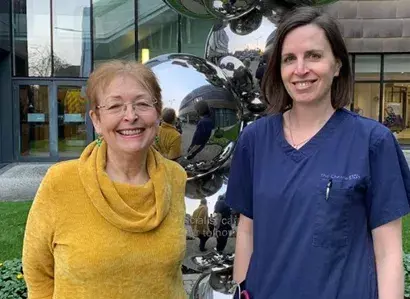Press release posted 18 January 2023
A retired primary school teacher with a matter of months to live is now enjoying life thanks to a new blood cancer drug she is taking as part of a clinical trial at The Christie NHS Foundation Trust in Manchester.
6 years ago Chris (Christine) Rennie, 63, from Meols, on The Wirral had been unwell for a year. She’d made several trips to see her GP, but the bone pain she was suffering was thought to be arthritis, night sweats were put down to the menopause and her asthma the cause of her chest infections. In May 2017 a blood test finally revealed she had myeloma, a type of blood cancer that develops from the cells in the bone marrow.
Chris had to endure nine types of chemotherapy over five years as well as a stem cell transplant at The Royal Liverpool hospital. She also had eight hospital admissions for sepsis and pneumonia and suffered broken bones including a spinal collapse.
With no options left and just a few months to live, the grandmother of 3 was referred to leading cancer centre, The Christie, and offered the opportunity of participating in a phase 1 (early phase) commercial clinical trial run by CellCentric, a privately-owned UK-based biotech company. In April 2022 Chris agreed to participate in research at the National Institute for Health and Care Research (NIHR) Manchester Clinical Research Facility (CRF) at The Christie NHS Foundation Trust (The Christie) in Manchester.
Thanks to CellCentric’s new trial drug, inobrodib, Chris is in partial remission with her cancer reduced by more than 50%. While myeloma isn’t a curable cancer, her cancer is currently well controlled. She now visits The Christie every four weeks for blood tests and monitoring.
“I feel better than I’ve felt in years. The side effects are minimal, and I’ve not had any infections since being on the drug.” Chris Rennie explains: “When I was diagnosed, I didn’t think I’d ever see a grandchild and now I spend so much time with them. It’s joyous. I enjoy life more than anyone I know. I do something enjoyable every day and I also make sure I walk 10,000 steps.
"I’m very lucky as I have a wonderful, close, supportive family especially, Steve, my husband of nearly 40 years and several very good friends. They help me stay positive. I’m so appreciative of still being alive. It gives me a real buzz. I’m now looking forward to meeting my fourth grandchild due to be born in the spring.”

To date, 26 patients with relapsed/refractory multiple myeloma (RRMM) have been treated with inobrodib on its own and not combined with any other drug. At the dose level now set for future trial expansion, 6 out of 7 patients had a reduction of a clinical marker which is used to determine the presence of myeloma. 3 out of 6 patients remain on treatment after more than 8 months. Treatment with inobrodib has been generally well tolerated in studies across different cancer types. Multiple patients have remained on treatment for over 12 months.
Dr Emma Searle, a consultant haematologist who has been leading the trial at The Christie and who has been in charge of Chris’s care, said: “These early results are exciting and show that inobrodib has the potential to offer patients with advanced multiple myeloma another option when conventional treatment has stopped working. Furthermore, inobrodib, in oral capsule form, offers an entirely new way of treating this type of cancer. Taken together, these findings provide clear encouragement for our ongoing clinical research into this drug.”
Professor Tim Somervaille, who leads the trial as chief investigator across the UK and Europe, and who is in addition a consultant haematologist at The Christie and Professor of Haematological Oncology at the Cancer Research UK Manchester Institute and The University of Manchester said: “Patients on this trial have run out of options and sometimes only have weeks to live, yet we’ve seen some remarkable responses with an improvement for some patients within days. Inobrodib seems to be well tolerated so it’s looking promising for certain difficult to treat blood cancers.
"Although we know it won’t cure people, we’re hopeful that it may extend life for some of our patients. And as it appears to have a good safety profile, with relatively few side effects, it’s offering a good quality of life for those who are responding well to the treatment. This is an early phase trial so there’s a lot more work to do – and we are testing the drug across a range of different blood cancers - but the data we have so far is very encouraging and could help many thousands of people in the future.”
Cancer Research UK funded the laboratory pre-clinical work at the Cancer Research UK Manchester Institute.
According to Cancer Research UK data, there are around 3,100 myeloma deaths in the UK every year, that’s more than 8 every day (2017-2019) making it the 17th most common cause of cancer death in the UK accounting for 2% of all cancer deaths.
Any patients interested in taking part in clinical trials should discuss this option with their consultant or GP. Not all patients will fit the criteria for a specific trial. While clinical trials can be successful for some patients, outcomes can vary from case to case. More information about taking part in clinical trials can be found on our taking part in studies and trials page.
